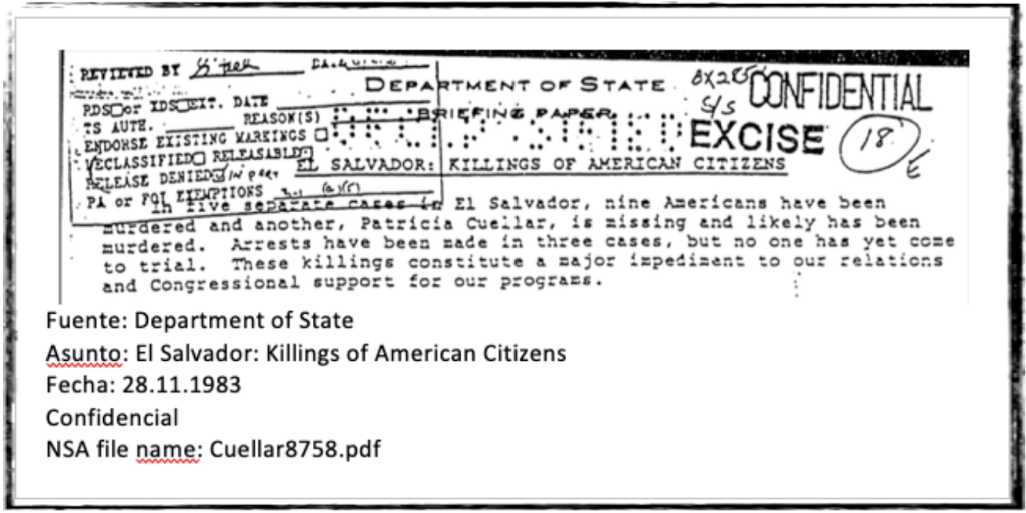June 12, 2024
Jacobin
On July 28, 1982, three people were illegally captured and violently disappeared by Salvadoran military and state security agents: Patricia Emilie Cuéllar Sandoval, a US and Salvadoran citizen; her father Mauricio Cuéllar Cuéllar; and Julia Orbelina Pérez, a domestic worker in the Cuéllars’ home. Had Patricia survived the dictatorship, she would have been my aunt. But 42 years after their disappearance, our family still has no answers as to their whereabouts or the location of their remains. All we have left to remember them are their names, along with those of 25,000 other victims of the armed conflict, in the Monument to Memory and Truth in San Salvador.
Like thousands of Salvadoran families, for decades Julia Orbelina’s family and our own have tirelessly sought truth and justice from the Salvadoran judicial system, without finding answers. Finally, in May 2024, after a lengthy and arduous judicial process, the Inter-American Court of Human Rights declared the Salvadoran state responsible for the forced disappearances of Patricia, Mauricio, and Julia Orbelina.
The IACHR ruling marks a crucial milestone on the road to justice in forced disappearance cases during the civil war. Nevertheless, the Salvadoran state’s policy of impunity persists as Bukele’s regime denies civil war history, refuses a transitional justice law for the victims, and blocks investigations into war crimes by the military. The United States is also guilty of contributing to this culture of impunity. The US government, which played a role in and condoned the atrocities committed during the military dictatorship, is withholding crucial information that could offer additional insight into the case.
Where Are Patricia, Mauricio, and Julia Orbelina?
Patricia Emilie Cuéllar Sandoval was born in the United States in 1958 to Salvadoran parents, who later relocated to El Salvador. Patricia was actively engaged in Catholic youth movements and basic ecclesial communities, grassroots organizations linked to the Catholic Church. She worked as a human rights defender at Socorro Jurídico Cristiano, an organization founded by Jesuit priest Segundo Montes and closely supported by Monsignor Óscar Romero. These activities were deemed reasons to label Patricia a subversive and communist and, as a result, she was disappeared — possibly tortured, raped, and murdered by the repressive forces of the Salvadoran state.
Years before her disappearance, Patricia and her family were subjected to military operations that involved several raids on their homes, interrogations, persecution, and intimidation by military and state security agents. Just days before her violent detention and disappearance, Patricia had informed the offices of Socorro Jurídico Cristiano that she had been followed by plainclothes police officers.
On the afternoon of July 28, 1982, soldiers and Salvadoran state security agents intercepted and illegally abducted Patricia. Alerts were raised by her family that something had happened to her when she failed to pick her children up from kindergarten that afternoon. The same night, between 10 and 11:00 p.m., another group of about 10 military and security forces raided the home of Patricia’s father, Mauricio Cuéllar, in San Salvador. After ransacking his house and retrieving documents and belongings, they violently took him and Julia Orbelina Pérez, who was working as a housekeeper in the Cuellars’ home.
The case of Patricia, Mauricio, and Julia Orbelina is one of thousands of incidents of forced disappearance and human rights violations committed by state forces during El Salvador’s civil war. Patricia’s case in particular exemplifies the systemic persecution and political violence by state security forces and death squads carried out in a joint and coordinated manner.
But the Salvadoran state is not solely accountable for the thousands of cases of human rights violations during the war. For decades, different US administrations trained, advised, funded, and supported the Salvadoran military dictatorship as part of a counterinsurgency strategy aimed at containing “communism” and maintaining political hegemony in Latin America. For instance, the School of the Americas, created by the US in 1946, was instrumental in indoctrinating military forces in the region with an anti-communist agenda and training them in counterinsurgency and repressive tactics. Thousands of security and military agents involved in death squads and in emblematic cases of human rights violations during the war were trained at the School. And, from 1980 to 1992, the US spent billions of dollars on military aid and economic assistance to support the dirty war in El Salvador.
With money, training, and other support from the US, the repressive forces of the Salvadoran state kidnapped, disappeared, tortured, raped, and murdered thousands of people like Patricia, Mauricio, and Julia Orbelina for political reasons. These crimes have left a lasting impact on Salvadoran society, resulting in persistent migration waves to the US, as the country struggles to address the wounds of the war.
The IACHR Court Ruling: 42 Years of Seeking Justice and Fighting Impunity
For 20 years, Patricia, Mauricio, and Julia’s families sought justice from El Salvador’s judicial system without success. In 2004, they took their case to the Inter-American Commission on Human Rights in Washington, DC and, after a long legal process, the IACHR Court scheduled a hearing for November 2023. On May 16, 2024, the Inter-American Court of Human Rights found the state of El Salvador responsible for the forced disappearances of Patricia, Mauricio, and Julia Orbelina, bringing a glimpse of justice and hope to their families and to the victims of the armed conflict. The court also concluded that Patricia’s disappearance constituted a violation of the right to defend human rights, which sets a significant precedent in a context where the current Nayib Bukele-led government is again committing grave human rights violations and is criminalizing human rights defenders and organizations.
The US government, which has never admitted or publicly acknowledged its involvement in atrocities during El Salvador’s civil war, is also accountable and owes explanations to Patricia, Mauricio, and Julia Orbelina’s families. Francisco Álvarez, Patricia’s husband, disclosed during his testimony before the IACHR Court that he had discovered some 20,000 declassified and digitized CIA documents that mention Patricia during a visit to the National Security Archive in Washington DC. These documents show that the CIA, FBI, and US State Department conducted confidential investigations into her disappearance. In one document, dating from November 1983, the State Department alleges that Patricia was murdered, and years later her name would be included on a commemorative plaque at the US Embassy in San Salvador, In Memory of Those Americans Who Lost Their Lives in El Salvador.

However, much of the crucial information about the case in the documents that Álvarez discovered is redacted and, despite his request for the release of the uncensored documents four years ago, the US government has yet to respond — part of a pattern of involvement in and then concealment of notable cases of human rights violations, such as the El Mozote Massacre and the assassination of Maryknoll nuns from the US.
In his testimony before the IACHR Court in November, Álvarez stated: “I would ask the court to urge the US agencies involved at that time in the investigation to release the information and contribute to the clarification of the truth. For us, the families of the victims, the fundamental thing is to put an end to impunity and to know where our dead are. Statements are not enough, a monument is not enough …”
***
I write this piece as I think of Patricia and as I resist a new authoritarian regime in El Salvador that continues to violate human rights and persecute those who defend them ― mirroring practices of the 1980s — and which has decided to uphold a policy of impunity for war crimes.
To break this historical cycle of impunity for the case of Patricia, Mauricio, and Julia Orbelina, and for thousands of others, the US government has a vital role to play by releasing unredacted archives related to Patricia’s case and initiating declassification for other archives that could shed further light on crimes committed by the Salvadoran military dictatorship, including information as to who was responsible and what happened to the victims. It is the US government’s duty, as a sponsor of the crimes, to act on its moral responsibility to the victims and their families and help them find justice.






